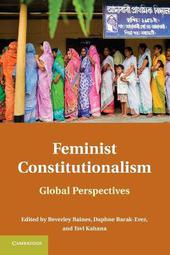
|
Feminist Constitutionalism: Global Perspectives
Paperback / softback
Main Details
| Title |
Feminist Constitutionalism: Global Perspectives
|
| Authors and Contributors |
Edited by Beverley Baines
|
|
Edited by Daphne Barak-Erez
|
|
Edited by Tsvi Kahana
|
| Physical Properties |
| Format:Paperback / softback | | Pages:494 | | Dimensions(mm): Height 239,Width 152 |
|
| ISBN/Barcode |
9780521137799
|
| Classifications | Dewey:342.0878 |
|---|
| Audience | | Professional & Vocational | |
|---|
| Illustrations |
2 Tables, unspecified
|
|
Publishing Details |
| Publisher |
Cambridge University Press
|
| Imprint |
Cambridge University Press
|
| Publication Date |
16 April 2012 |
| Publication Country |
United Kingdom
|
Description
Constitutionalism affirms the idea that democracy should not lead to the violation of human rights or the oppression of minorities. This book aims to explore the relationship between constitutional law and feminism. The contributors offer a spectrum of approaches and the analysis is set across a wide range of topics, including both familiar ones like reproductive rights and marital status, and emerging issues such as a new societal approach to household labor and participation of women in constitutional discussions online. The book is divided into six parts: I) feminism as a challenge to constitutional theory; II) feminism and judging; III) feminism, democracy, and political participation; IV) the constitutionalism of reproductive rights; V) women's rights, multiculturalism, and diversity; and VI) women between secularism and religion.
Author Biography
Beverley Baines is a Professor of Law, Gender Studies, and Policy Studies at Queen's University. Since 2005, she has served as Head, Department of Gender Studies. Since co-editing The Gender of Constitutional Jurisprudence with Ruth Rubio-Marin (2004), she has authored papers on sex equality jurisprudence under the Canadian Charter of Rights and Freedoms; the implications of long-term care homes legislation for women; feminism and contextualism in the jurisprudence of former Supreme Court of Canada Justice Bertha Wilson; and the Charter conflicts posed for feminist sex equality proponents by religious freedom claimants in the contexts of polygamy (in Canada), faith-based family arbitrations (in Ontario) and multicultural accommodation (in Quebec). Daphne Barak-Erez is a Professor of Law at the Faculty of Law of Tel-Aviv University, where she holds the Stewart and Judy Colton Chair of Law and Security. She specializes in administrative law, constitutional law, comparative law and gender law. She is the recipient of several prizes, including the Rector's Prize for Excellence in Teaching (twice), the Zeltner Prize, the Woman of the City Award (by the City of Tel Aviv) and the Women in Law Award (by the Israeli Bar Association). She is the author and editor of three books, most recently, the author of Outlawed Pigs (2007) and the co-editor of Exploring Social Rights (2007), and has published more than seventy articles. Tsvi Kahana is an Assistant Professor of Law at the Faculty of Law, Queen's University. He is the co-editor (with Richard W. Bauman) of The Least Examined Branch: The Role of Legislatures in the Constitutional State (2006). He works in the area of constitutional law and theory with a particular emphasis on the role of legislatures. He is also the co-editor of the Review of Constitutional Studies. Between 2000 and 2004 he was the Executive Director of the Centre for Constitutional Studies at the University of Alberta.
Reviews"Should a feminist constitutionalism exist, or a dialogue on constitutionalism that took feminist insights seriously, this book would be part of it. As things are, it calmly challenges limits and unsettles complacency by exceeding its own envelope, putting more solid ground under women's feet as it expands law's horizons." - Catharine A. MacKinnon From the foreword of Feminist Constitutionalism "Feminist Constitutionalism offers a radically new perspective on the very foundations of our legal systems, going beyond 'feminism and the law' to assess the texts and traditions of the world's constitutions through the lens of gender justice. This latest contribution to a burgeoning new field draws together leading legal scholars from around the world, lifting us out of our legal parochialism, and confronting the masculine practices and assumptions of constitutional law. It is sweeping in scope, and eclectic in the best sense of the word. How, the authors ask, can constitutionalism be reconfigured to serve the interests of gender equality? In answering this question, this volume opens a window on a landscape that has long been overlooked. Every reader - whether feminist or not - will learn much from this book's engagement with the radical idea that constitutions are not gender-neutral." Helen Irving Professor of Law, The University of Sydney "If dignity, liberty and equality shall make sense in our complicated worlds, and if democracy shall work in multilevel constellations of constitutional law, then this book is an important contribution towards it. A feminist intervention that deserves the name, diverse, transnational, and with a grip on the hard cases, this work proves to be a very inspiring read." - Susanne Baer Richterin des Bundesverfassungsgerichts, Professorin fur OEffentliches Recht und Geschlechterstudien an der, Humboldt-Universitat zu Berlin & James W Cook Professor, University of Michigan Law School
|